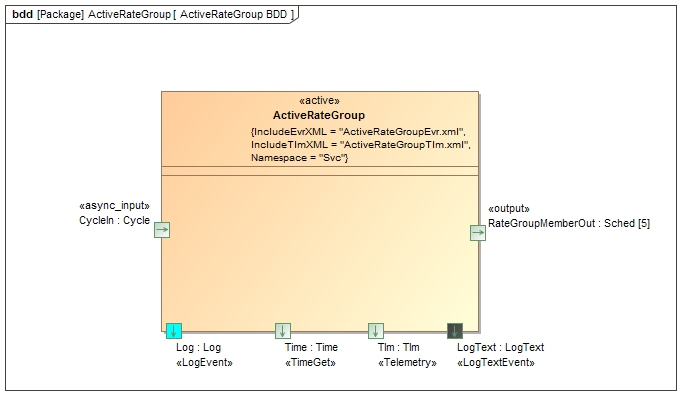 |
F´ Flight Software - C/C++ Documentation
devel
A framework for building embedded system applications to NASA flight quality standards.
|
 |
F´ Flight Software - C/C++ Documentation
devel
A framework for building embedded system applications to NASA flight quality standards.
|
Svc::ActiveRateGroup is an active component that drives a set of components connected to Svc::Sched output ports. It contains an asynchronous input Svc::Cycle port. This port sends a message which wakes the component task. It contains an asynchronous input Svc::Cycle port. This port sends a message which wakes the component task. The task invokes each output port in order, passing an argument indicating the order. It tracks execution time and detects overruns.
The requirements for Svc::ActiveRateGroup are as follows:
| Requirement | Description | Verification Method |
|---|---|---|
| ARG-001 | The Svc::ActiveRateGroup component shall be active and will be woken up by an input asynchronous port call | Inspection, Unit test |
| ARG-002 | The Svc::ActiveRateGroup component shall invoke its output ports in order, passing the value contained in a table based on port number | Unit Test |
| ARG-003 | The Svc::ActiveRateGroup component shall track the time required to execute the rate group and report it as telemetry | Unit Test |
| ARG-004 | The Svc::ActiveRateGroup component shall report a warning event when a rate group cycle is started before previous is completed | Unit Test |
The Svc::ActiveRateGroup component has the following component diagram:

The Svc::ActiveRateGroup component uses the following port types:
| Port Data Type | Name | Direction | Kind | Usage |
|---|---|---|---|---|
| `Svc::Cycle` | CycleIn | Input | Asynchronous | Receive a call to run one cycle of the rate group |
| `Svc::Sched` | RateGroupMemberOut | Output | n/a | Rate group ports |
The Svc::ActiveRateGroup component has one input port that is called to wake up the task to execute one cycle.
A set of context values are passed in as an array to the configure function:
A context value can be used by a component to discriminate between more than one call in the rate group.
The task of the component calls the output ports in order, passing the context from the context list as the port argument.
The component sets a flag when the cycle port is invoked. At the beginning of the rate group execution, the component clears the flag. If it detects that it has been set again at the end of the rate group cycle, it will declare a cycle slip, send an event, and increase the cycle slip counters.
As described in the Functional Description section, the Svc::ActiveRateGroup component accepts calls to the CycleIn and invokes the RateGroupMemberOut ports:
Svc::ActiveRateGroup has no state machines.
Svc::ActiveRateGroup has no significant algorithms.
TBD
| Document | Link |
|---|---|
| Design Checklist | Link |
| Code Checklist | Link |
| Unit Test Checklist | Link |
To see unit test coverage run fprime-util check –coverage
| Date | Description |
|---|---|
| 6/22/2015 | Design review edits |
| 7/22/2015 | Design review actions |
| 8/10/2015 | Updated to cycle input port |
| 8/31/2015 | Unit test review updates |